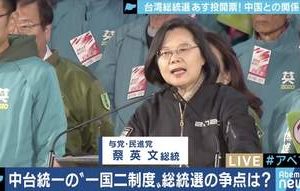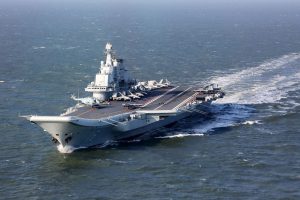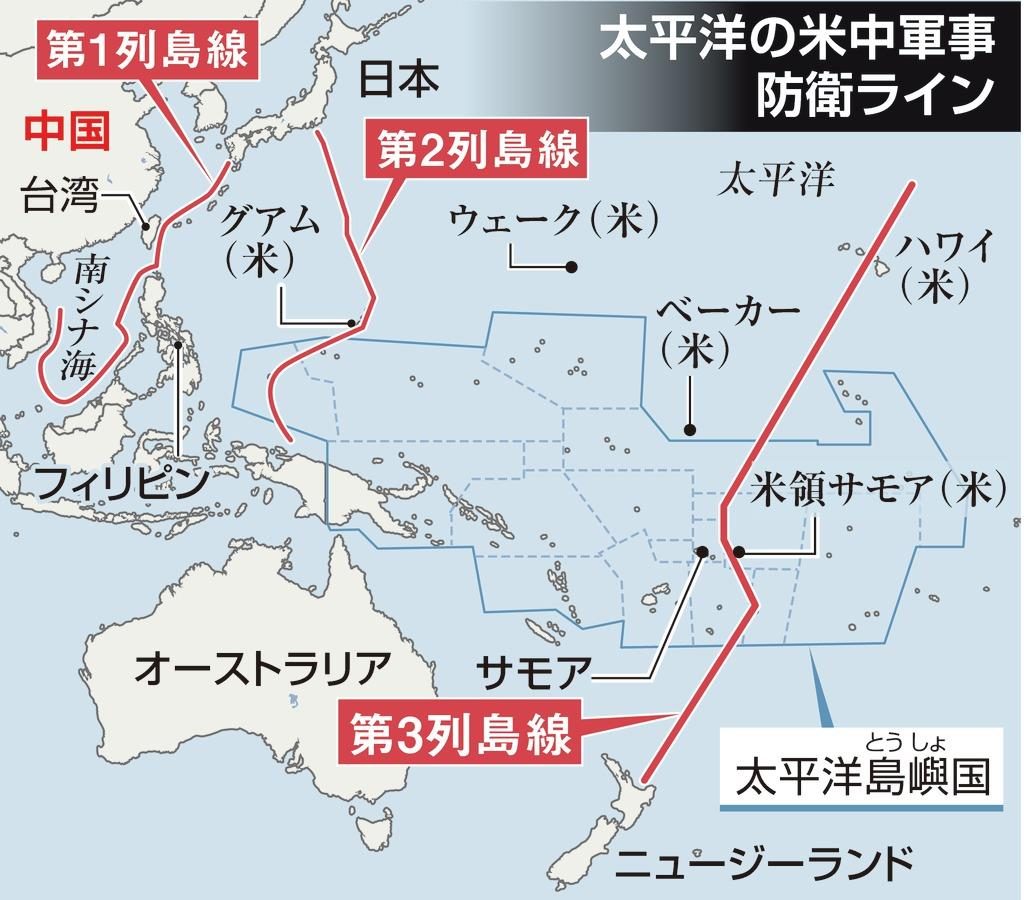US President Joe Biden delivered his first policy speech since taking office at a joint session of the US Senate on April 28. He said, "I don't want a clash with China," and "prevent a conflict rather than start it." He repeatedly emphasized the non-use of force in the battle for hegemony with China. Meanwhile, at a press conference after the Japan-US summit meeting on April 16, Prime Minister Yoshihide Suga stated" I said to the president that We need to strengthen the deterrence and coping power of the Japan-US alliance. ". US-Japan relations are squeezing over the Taiwan issue, which is China's greatest core interest . Taiwan is an explosives depot for the US-China military conflict. The United States is throwing the territorial dispute over Taiwan and its part, the Senkaku Islands, to Japan as a matter of the East China Sea . In other words, "Taiwan emergency is Japan's emergency", " Japan should strengthen its deterrence and defense capabilities, and integrate the Senkaku with Taiwan to prepare for defense." This is the true intention of the US administration, which does not want to clash with China. In addition to the application of Article 5 of the Japan-US Security Treaty to the Senkaku, Biden's remark that "protecting Japan's security with an iron wall" is nothing more than a lip service. On the contrary, Japan is becoming a shield for Taiwan's defense to replace the United States .
■ US and Taiwan virtually restore diplomatic relations
US President Joe Biden in foreign policy in his policy speech "on the phone talks with China's Xi Jinping , in order to prevent it rather than start a conflict we maintain a strong military presence in the India Pacific Ocean" . "We welcome competition, but we don't want conflicts. We have stated (to Mr. Xi) that we will protect the interests of the United States in general in a battle for hegemony between the United States and China."
Thus, the highest proposition of the US government is to avoid military conflict with China . On the other hand, however, Taiwan began to be called the "Republic of China" and virtually abandoned the "one-China" agreement, and the US policy toward China reversed the hands of the clock and normalized US-China diplomatic relations and US-Taiwan diplomatic relations in 1979. It is returning to before the disconnection.
 In fact, President Biden infuriated China at the inauguration ceremony on January 20, 2021 by inviting Taiwan's de facto ambassador to the United States, Mikoto Yasu, for the first time since the severance of diplomatic relations between the United States and Taiwan . In addition, three informal representatives, including former Senator Dodd and former Deputy Secretary of State Richard Lee Armitage , were dispatched to Taiwan at the same time as Prime Minister Suga's visit to the United States to meet with Taiwan's President Tsai Ing-wen .
In fact, President Biden infuriated China at the inauguration ceremony on January 20, 2021 by inviting Taiwan's de facto ambassador to the United States, Mikoto Yasu, for the first time since the severance of diplomatic relations between the United States and Taiwan . In addition, three informal representatives, including former Senator Dodd and former Deputy Secretary of State Richard Lee Armitage , were dispatched to Taiwan at the same time as Prime Minister Suga's visit to the United States to meet with Taiwan's President Tsai Ing-wen .
China, which is gathering military pressure on Taiwan and the Senkaku, naturally vehemently opposes the movement of the US government, saying , "Don't play with fire ." According to Reuters, on the other hand, US government officials said , " Biden dispatched personally 3 intimate, long-time friends It is an important sign that shows the United States of involvement in the democracy and Taiwan".
In Mr. Biden's words, " Taiwan is a fortress of a democratic system that fights tyranny , " and it is natural for the Biden administration to support Taiwan.
If you receive it at face value, the US-China relationship is on the verge of breaking over the Taiwan issue.
■ The Japanese government is at the mercy
At a Senate hearing on April 9, US Indo-Pacific Commander Davidson said that the military balance between the United States and China in the Indo-Pacific has changed sharply in China's favor. The risk of aiming to change the status quo is increasing. " The Pentagon predicts that the Anti-Access / Area Denial (A2 / AD) strategy aimed at disrupting U.S. military operations in the event of an emergency will be expanded to almost the entire western Pacific Ocean by 2025. "
The ministry also said that the number of U.S. military fighter units deployed forward in Japan and Guam is not expected to increase from the current 250, while China will increase the current 1250 to the latest in 2013. He pointed out that it would overwhelm the US military by expanding to about 1950 aircraft, including about 150 fifth-generation aircraft.
 [ Photo ] China's first domestic aircraft carrier "Shandong" passing through the Taiwan Strait from north to south in December 2020 China currently owns three aircraft carriers
[ Photo ] China's first domestic aircraft carrier "Shandong" passing through the Taiwan Strait from north to south in December 2020 China currently owns three aircraft carriers
Against this background, Prime Minister Suga said at a joint press conference after the Japan-US summit meeting, "(Regarding the increasingly severe security environment in East Asia)," It is necessary to strengthen the deterrence and coping power of the Japan-US alliance. He stated (to the president) his determination to strengthen his defenses. " In reality, Japan was forced to act on behalf of the United States. Naturally, the United States will force Japan to purchase a large amount of "state-of-the-art weapons."
For the past 10 years or so, it has been the Japan Coast Guard and the Self-Defense Forces that have a glare behind them that have been confronting the China Coast Guard and the PLA behind them, reminiscent of an immediate crisis. is there. As far as the media reports are concerned, both the Taiwan Strait and the East China Sea remain in critical tension. Japan's Suga administration is now at the mercy of the US government.
■ "Taiwan's emergency is Japan's emergency"
Japan has some influential table organizations that are clearly moving in line with the intentions of the US administration, and there are numerous commentators who openly represent the intentions of the United States.
One of the representative ones is that several former Self-Defense Forces executives have appeared on the conservative internet media under the umbrella of a leading economic newspaper as pro-American right-wing controversialists . Some eccentric shouts, "This is not the case when we are threatened by China and the country is on the verge of survival, such as social security and measures for the elderly. Increase defense costs significantly." He finally retired from the commander of a certain army of the Self-Defense Forces, and now serves as an advisor to Japan's largest munitions company. Such executive self-defense officers are being created one after another from the Self-Defense Forces, which have become monsters under postwar democracy and Article 9 of the Constitution.
This nationalist right-wing media argues that the Japan- US alliance will become bilateral only when the United States, Japan, and Taiwan are united, for example:
"The United States can rest assured that Japan and Taiwan have stopped China from expanding into the Pacific Ocean.
Once Japan and Taiwan are occupied by China and within their territory, Chinese troops will be free to roam Hawaii in the middle of the North Pacific, beyond it, to the East Pacific and off the west coast of the United States. There will be.
So far, Japan and the United States have kept Chinese troops closer to China than the midline between the Nansei Islands and mainland China, but if the United States does not protect Japan and Taiwan, which act as fortresses, China will be within the East China Sea. The threat of China is approaching near its own country.
In other words, considering the central main castle and many branch castles for protecting the territory from a global perspective, the United States is the main castle, and Japan and Taiwan are the front-line branch castles (fortresses).
The United States, Japan, and Taiwan, which have a relationship between the main castle and the branch castle, can be said to be a fateful community. "

[Figure]US-China defense line in the Pacific
The U.S. Pacific Army Commander Keating (then), who visited China in May 2007, said at the U.S. Parliament the following year, "A senior Chinese Navy official said, 'It's a joke.' I was asked, "How about China controlling the Pacific Ocean in the west from Hawaii??"
Chaired by Yoshiko Sakurai, the Japan Institute for National Fundamentals, which is integrated with the Nippon Kaigi, held a monthly meeting in April under the theme of " Taiwan contingency is Japan contingency. " Mr. Sakurai sums up the meeting as follows.
"A face-to-face meeting between US President Joe Biden and Prime Minister Suga was held, and a joint statement clearly stated Taiwan, or a former U.S. government official visited Taiwan and the Communist Party of China responded radically. It is no exaggeration to say that the "Taiwan Strait wave height" is shown.
In fact, provocative exercises by Chinese fighters around Taiwan have become more active, and at the same time, the obsession with the Senkaku Islands has been seen in the revision of the Maritime Police Law, and they are trying to fill the outer moat by making full use of the three battles. The point of view that the increasing reality of Taiwan's contingency and Japan's defense is one-of-a-kind water is a theme that should be discussed right now.
This time of the panelists, Ming Taipei Ambassador Economic and Cultural Representative Office Vice President, Keisuke Suzuki, former Deputy Minister of Foreign Affairs, align the polemic that Fumio Ota a councilor of the Japan Institute for National Fundamentals Planning , proceeded in Yoshiko Chairman moderator Sakurai.
First, President Sakurai urged each panelist to find out what Japan should do in the current situation where China's ambitions of one-party dictatorship are manifested.
First, Ming Vice President described the current situation of Taiwan while projecting the presentation material which is entitled "New Cold War era to put the Taiwan of the corresponding". In particular, many of the young people in Taiwan today are pro-Japanese, and they have high hopes for deepening exchanges between Japan and Taiwan in each field.
House of Representatives Suzuki said that China is 2 km from Kinmen Island at the western end of Taiwan, and until a while ago it was thought that the invasion of Taiwan was ahead, but now it must be considered as a real problem. Expressed a sense of crisis. Furthermore, Planning Committee member Ota announced that protecting Taiwan, which is a geopolitically important base, is the lifeline of Japan , based on the future forecast of the military aspect .
After that, there were opinions and questions from experts who serve as officers of the National Institute of Technology on the floor, and finally Chairman Sakurai concluded that Japan needs the spirit that "Taiwan emergency is Japan emergency". "
The U.S. ruling class and Deep State, which consists of the U.S. administration and the huge capital mainly in the financial, munitions, and IT industries behind it, overtly pressured "Japan will protect Taiwan " through Japanese agents. Is hung.
In the last 10 years, the phrase "increasingly severe East Asian security environment" has been repeatedly used along with "China's threat" in the Defense of Japan . The US administration's move to restore diplomatic relations with Taiwan has decisively destroyed the "security environment in East Asia." It was done intentionally. It is the spirit of the Biden administration that Japan should pay for this.
"It is unfair to impose Japan's defense obligations, including the Senkaku, on the United States and try to stand by the Taiwan emergency." He hunted down the Japanese government with the theory of free-riding security, which had been used for many years, and threatened to say, "Be prepared for a Taiwanese emergency as a Japanese emergency."
The Japanese government, which has insisted that successive administrations " hope that the cross-strait (Nakadai) problem will be resolved peacefully through discussions, " is on the verge.
The sequel examines the substance of the fictional "East Asian security environment that is becoming more severe."
Note : "Japan-US relations further distorted'Japan's top priority'when visiting the United States 1", "Japan enters the" 30 years of darkness "when visiting the United States 2", "Biden's irreverent Japan-US relations shown by the hamburger lunch" Please refer to the above-mentioned articles such as "Japan and South Korea are forced to strengthen their attitude toward China as the United States speculates on the additional supply of vaccines."
